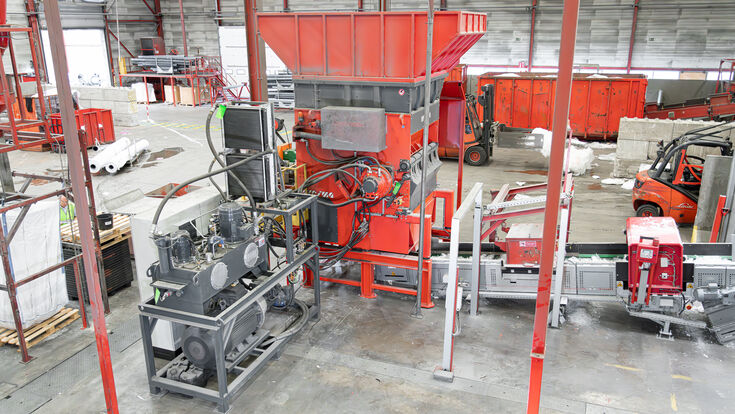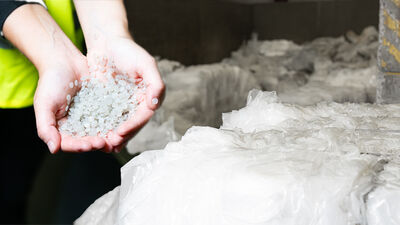Plastic Recycling : LDPE film recycling with WEIMA shredder at RKW in Belgium

WEIMA W5.18 single-shaft shredder for LDPE films at RKW
- © WEIMARKW in Hoogstraten, founded in 1975 and part of the RKW Group since 2014, is a film producer for various applications in agriculture, horticulture, the construction industry and the processing industry. The portfolio includes silage and grain hoses, agricultural films, inliners, greenhouse and horticultural films, which are produced on state-of-the-art extrusion lines with up to seven layers and up to 20 meters wide. The company is one of the market leaders and offers individual solutions tailored to the specific requirements of the target group.
Material waste from production is recycled internally at RKW. External film waste is also purchased to cover the demand for regranulate. During the Covid-19 pandemic, RKW decided to invest in a new shredding and extrusion system to optimize the recycling process. Capacities were also to be further expanded. After numerous material tests and reference visits in the surrounding area, the WEIMA W5.18 single-shaft shredder and the F:GRAN feeder-extruder combination from NGR were chosen.
WEIMA W5.18 shredder: Powerful for demanding film applications
With a rotor length of 1,800 mm, an 80 mm round hole screen and a 160 KW hydraulic direct drive from Hägglunds Bosch Rexroth, the WEIMA W5.18 single-shaft shredder shreds an average of four tons of plastic per hour.
"That's a very good result. Before deciding on a WEIMA shredder, we had some references here in the neighborhood. We contacted our colleagues and asked them: Is the WEIMA shredder as good as everyone says? The answers were consistently positive. That was a decisive factor for us in choosing to work with WEIMA." Tom Bevers, Technical Manager at RKW in Hoogstraten
The keys to success: Hydraulic drive and safe maintenance
The use of a hydraulic drive is an advantage for RKW. Due to the extremely low mass moment of inertia and the active hydraulic braking function of the drive train in conjunction with the shortest reaction times, it is much less sensitive to foreign objects and vibrations of any kind compared to electromechanical drives, thus minimizing damage to the machine and cutting geometry. Particularly with flexible materials such as filaments, big bags or even films, the hydraulic drive enables an extremely high cutting force and a high torque and breakaway torque.
"We are very familiar with hydraulic drives, so that was a plus point and an important reason for the purchase. The machine is also very simple and easy to understand, not too complex. This makes maintenance easier and saves time and money " Tom Bevers, Technical Manager at RKW in Hoogstraten.
Service work on the WEIMA shredder can be carried out safely and conveniently via the wide inspection flap and the screen basket. Previously, employees had to climb into the old shredder (a third-party product) from above via the hopper opening to carry out repairs.
After shredding, the last metal residues are removed from the material using an overband magnet. This is followed by further separation and drying of the shredded plastic film before it is transported to 30 cubic meter mixing silos. These then finally fill NGR's extrusion line, with the material being continuously circulated in advance.
Optimization of the recycled pellets: NGR extruder with BritAS belt filter
In the F:GRAN, the flakes are processed into high-quality granulate at a consistently high throughput rate. "In order to increase our capacity and improve quality, we looked around the market. The feeder-extruder combination from NGR impressed us with its excellent price-performance ratio, among other things. In addition, the BritAS belt filter can be easily integrated into the system," says Tom Bevers. The BritAS filter improves the cleaning of the flakes by automatically using a new screen mesh every time the filter is changed. In combination with extremely gentle extrusion, this ensures consistently high pellet quality and makes it possible to remove impurities from the machine with minimal melt loss.

The extruder previously used had a very long screw. The dwell time of the material in this screw was sometimes too long, resulting in quality problems with the recycled pellets. The new feeder-extruder combination from NGR solved these problems. In combination with the high filtration performance of the BritAS filter, the quality of the recycled pellets was significantly improved.
"The implementation of the two projects - WEIMA and NGR - went hand in hand. The primary goal was to increase the quality and output of our recycling plant. We have achieved this. We can now recycle more material and achieve better quality recycled pellets than before. This will allow us to continue to grow in the future," summarizes Tom Bevers.

